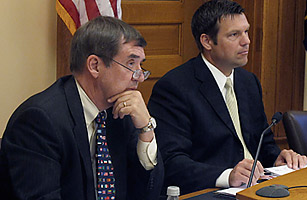
Kansas’ efforts to shut down two abortion providers will have to wait as a federal judge temporarily blocked the state Friday from imposing tough new licensing restrictions.
U.S. District Judge Carlos Murguia, reading from the bench, issued a preliminary injunction, saying providers and women would suffer “irreparable” injury if the regulations took effect Friday as scheduled. The injunction will hold until a trial determines the legality over rules that, among other things, mandate the size of janitors’ closets and require lockers for patients.
“This is a tremendous victory,” said Nancy Northup, president and CEO of the Center for Reproductive Rights, which represented a father-daughter team from Overland Park, Kan. who had been denied a license.
“The facts were clear,” said Northup, “this licensing process had absolutely nothing to do with patient health or safety and everything to do with political
shenanigans.”
One other clinic, Aid for Women in Kansas City Kan., will also be able to reopen its doors. Planned Parenthood, after purchasing a “neo-natal crash unit” that it said was unnecessary, was able to meet the licensing requirements at the last-minute on Thursday. If not for the judge’s Friday order, that clinic would have been the only provider left in the state.
Mary Kay Culp, executive director of Kansans for Life, says it was never the law’s intent to shut down abortion clinics and notes that although South Carolina has a similar law, clinics there have survived. Abortion providers are “putting on a show,” she says. “They’re the ones who said if you make abortion legal, we’ll keep women safe,” she says. “Why wouldn’t you want rooms big enough to get gurneys in and out of?”
But supporters of abortion rights said the Kansas law was part of a coordinated national campaign to chip away at a woman’s right to reproductive freedom. “More like hack away,” said Northup.
“Since the November elections,” added Tait Sye of the national Planned Parenthood office in New York, “we’ve gone through the greatest legislative assault on women’s health in a generation.”
If the new regulations in Kansas are ultimately upheld, Planned Parenthood said its services will be strained. About 8,000 women a year seek abortions in Kansas; Planned Parenthood performed about 5,000 of them last year, the other two providers handling 3,000. That likely includes a large number of patients from across the state line, where Missouri already has tough restrictions in place and there are no clinics in the urban core of Kansas City.
Dr. Herbert Hodes, who filed suit with his daughter, says abortion is just one of the services he and his daughter provide in their private ob-gyn practice. He delivers babies at nearby hospitals and performs other procedures, like tubal ligations, in his office. He says there’s no reason to mandate patient lockers — he notes that hospitals usually just put a patient’s belongings in a bag under the gurney when they go from pre-op to surgery to recovery.
“It’s a joke and a sham,” Hodes told TIME. “The only purpose is to shut down access to abortions.” He says he complies with rules from the Kansas Board of Healing Arts and the American College of Obstetrics and Gynecologists since “they’re realistic regulations drawn up by doctors for doctors. We all know how much legislators know about health care for women — nothing,” Hodes says.
Kansas legislators have tried to implement similar regulations before but gained traction only with the election of the conservative Brownback. Kansas is also one of the states where lawmakers are trying to block funding for Planned Parenthood. The state has long been a hotbed for the abortion issue; it’s where Dr. George Tiller, who famously offered late-term abortions in Wichita, was murdered in 2009.
Jeff Pederson of Aid for Women echoes Hodes’ complaints about unnecessary regulations, saying that one of the new codes mandates a two-hour recovery period. He says that when he accompanied his father to get his teeth pulled, his dad was sedated, yet they left 10 minutes after the procedure was complete. “The women don’t want to stay here two hours, and they don’t need to. They have a caregiver with them. They’re drunk, but they’re walking.”
The majority of Pederson’s clients are low-income or minorities, he says, and he fears folks will go back to pre–Roe v. Wade days of seeking home remedies or other means to avoid an unwanted pregnancy. “I can remember what it was like before.”See why teen pregnancy and abortions are on the rise.See the top 10 knockdown congressional battles.